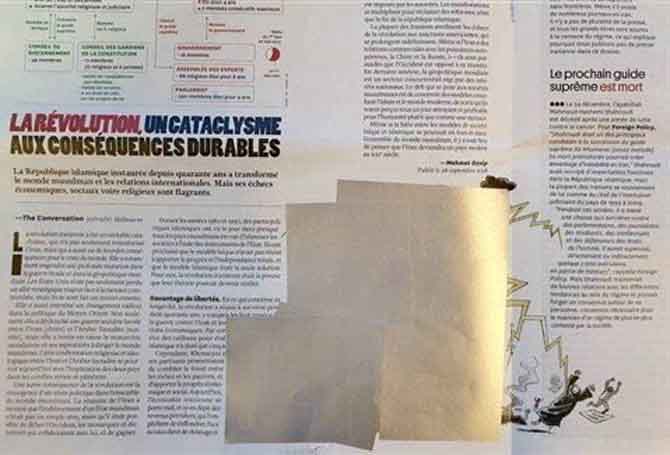BEIRUT: Lebanon’s General Directorate of General Security has censored a caricature of Iran’s Supreme Leader Ali Khamenei that was published in the French weekly Courrier International.
The directorate covered the caricature with a sticker before allowing the publication to enter Lebanon.
The move has sparked debate on social media, including criticism and questions as to whether the directorate is affiliated with the Shiite group Hezbollah, a close ally of Tehran.
There were also questions as to whether such censorship would apply to other leaders who are caricatured by the French newspaper.
Journalist Dima Sadek shared the caricature on social media in defiance of the censorship. Journalist Diana Moukalled wrote: “Censorship makes people more aware. The authorities are presenting themselves as ridiculous, confused and absurd.”
They and other journalists who oppose the censorship faced a backlash from Khamenei supporters, who described them as “puppets.”

Social media activists led a campaign to block Sadek’s accounts, accusing her of deliberately insulting religious figures.
Ali Al-Amin, director of Al-Janoubia news website, told Arab News: “Khamenei is a cleric but he deals with public affairs. He’s a political figure and a state leader who’s active in international and regional politics. Therefore, he may get criticized or represented in a caricature, and whoever says he’s untouchable is wrong.”
Al-Amin said: “There’s discretion in media censorship, and we don’t know what standards were used in this censorship.”
He added: “Lebanon will see more restrictions on public freedom.”
He criticized the use of a sticker to cover the caricature, saying: “People in Lebanon wouldn’t have noticed the caricature had the newspaper entered Lebanon as usual. No one would’ve commented on it.”
He added: “Newspaper readers are few and the majority of Lebanese readers turn to websites, so what was the point of censorship in this case?”
The head of Lebanon’s Syndicate of Editors, Joseph Al-Qasifi, told Arab News: “Foreign publications, as well as cultural products such as films, are subject to censorship by the (directorate) before they enter Lebanon as per the Publications Law.”
He said: “We generally say freedom of opinion and freedom of the press in Lebanon have to be protected. This is a sacred matter that’s stated in the constitution.”
He added: “I think censorship by the (directorate) needs to be amended in a workshop for the ministries of information, interior and justice, because amendment requires issuing laws by Parliament. As syndicates, we have an advisory role.”
A source in the directorate said its head, Maj. Gen. Abbas Ibrahim, “is strict when it comes to all that could affect Lebanon and it relations, and prefers to have the oversight body criticized over allowing conflict inside the country.”




